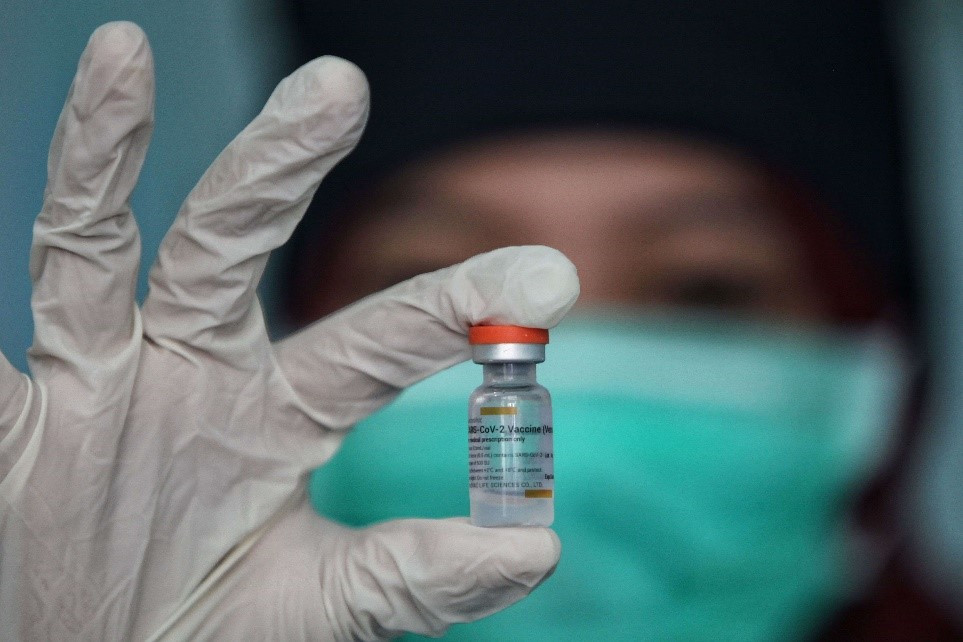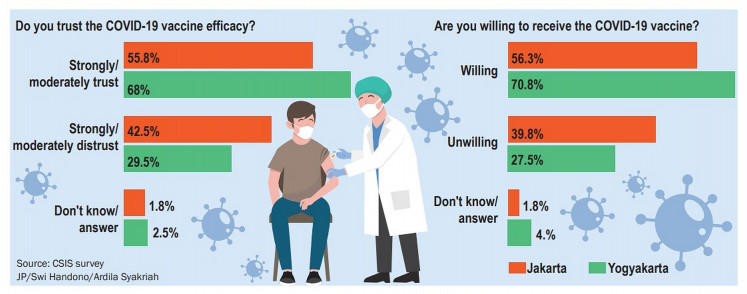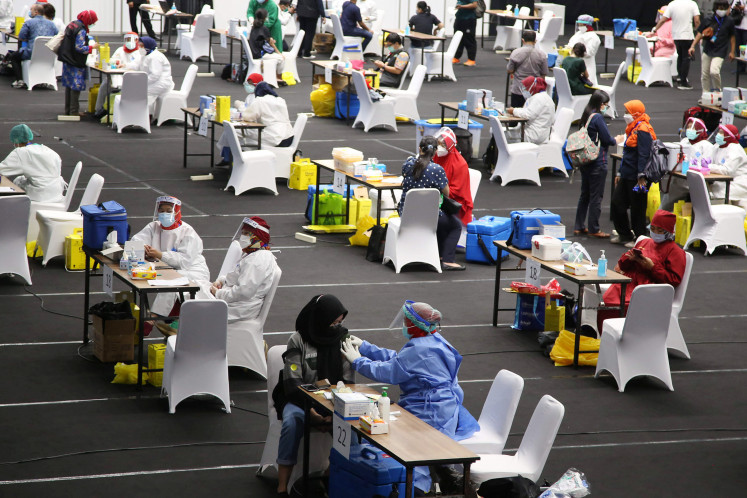Popular Reads
Top Results
Can't find what you're looking for?
View all search resultsPopular Reads
Top Results
Can't find what you're looking for?
View all search resultsGovernment pins hopes on vaccine despite lukewarm reception
Surveys have found that vaccine distrust and objection remain high in Indonesia, even as the government rolled out the second stage of its COVID-19 inoculation program on Feb. 17.
Change text size
Gift Premium Articles
to Anyone
As Indonesia rolls out its COVID-19 inoculation program for second priority recipients, public doubt remains a challenge alongside the limited vaccine supply.
The latest survey by the Centre for Strategic and International Studies-Jakarta (CSIS) found that 42.5 percent of respondents in the nation’s capital said they either strongly or moderately distrusted the efficacy of COVID-19 vaccines. In the cultural hub of Yogyakarta, the figure was 29.5 percent.
In Jakarta, 40 percent of all respondents said they did not want to be vaccinated, while 27.5 percent of respondents in Yogyakarta said the same.
"These figures are not ideal, even more so at a time when the second stage of the vaccination program is being rolled out for essential workers and the vulnerable age group," CSIS researcher Noory Oktarhiza said when the survey findings were released on Thursday.
"There must be information dissemination and hard work to make people believe in COVID-19 vaccines," Noory added.
The survey polled 400 people of various age groups and educational backgrounds in Jakarta and 400 others in Yogyakarta on Jan. 13-18, the week that Indonesia started its mass vaccination rollout, starting with health workers. Jakarta was chosen as a survey target because it has been the epicenter of the nationwide epidemic, and Yogyakarta for its renown as the nation’s cultural authority.
Many respondents were against vaccination citing uncertainties over their quality, as yet unproven effectiveness and safety, or adverse events and halal status.
CSIS researchers found strong correlation between the level of a respondent’s trust in the vaccines and their belief in whether or not COVID-19 was real and spreading in the country, one year into the pandemic.
Of the total respondents in Jakarta, 10.3 percent said they strongly or moderately did not believe that COVID-19 was real, while the figure was 6.3 percent among Yogyakarta respondents.
Also of concern to researchers was that among respondents of all age groups who said they did not believe COVID-19 was real, the largest proportion was found in the so-called Generation Z (Gen Z) group, between 17 and 22 years of age. Researchers found that respectively 18.2 percent and 21.4 percent of Gen Z respondents in Jakarta and Yogyakarta did not "believe in COVID-19".
A similar trend was reflected in the respondents’ level of trust in the efficacy of COVID-19 vaccines, with older respondents generally indicating more trust in the vaccines than their younger counterparts. Further, the respondents who believed in the vaccines' efficacy were nine times more willing to be inoculated than those who did not.
In Jakarta, more than half of respondents in the Gen Z and Millennial (23-38) age groups said they somewhat or strongly distrusted the vaccines, at 63.6 percent and 53.1 percent, respectively. In Yogyakarta, the respective figures were 55.6 percent and 45.7 percent.
"This is concerning amid the abundance of information on social media, and Generation Z is among the highly active groups on social media," said CSIS researcher Edbert Gani Suryahudaya.
A glance at the Communications and Information Ministry' website provides shows the range of vaccine hoaxes and misinformation it has been trying to debunk, from the vaccines containing pork derivatives to the substances’ ability to change human DNA.
Indonesia’s vaccination program targets 181.5 million recipients aged 18 and above, the majority in the productive age group given the country's demographic composition.
Read also: Get vaccinated or lose your social aid, Indonesian government says
The government allowed sanctioning citizens that refused vaccination just days before it started rolling out the second stage of its vaccination program last week, which targets 21 million elderly people and 17 million essential workers.
The second stage of the program commenced with vaccinating traders at Tanah Abang Market in Jakarta. Meanwhile, the Health Ministry started the gradual distribution of 7 million vaccine doses for the elderly in 34 provinces in the country.
On Friday, the ministry’s COVID-19 vaccine spokeswoman, Siti Nadia Tarmizi, said that 70 percent of the country’s limited vaccine supply was prioritized for distributing to the capital cities of seven provinces in the hardest-hit regions of Java and Bali. The remaining 30 percent was slated for distribution to the 27 other provincial capitals.
She said that while Jakarta had started inoculating its elderly, the coverage was still too small, adding that the ministry was focusing on collecting data on prospective recipients.
Inoculation data showed that 1.2 million of the 1.5 million targeted health workers had received their first shot as of Sunday, while around 736,000 health workers had received both their first and second doses.
Teti Tejayanti of the ministry's health research and development agency suggested that the high level of vaccine distrust and objection was because the survey was held at the start of the inoculation program. She believed that the figures might be lower now that the second stage had begun, especially amid the absence of reports on serious adverse events following immunization (AEFIs).
"When it comes to vaccination, there must be a durational series [of surveys] because COVID-19 is dynamic," Teti said. She added that if vaccine distrust and objection remained high, the first step was to educate the public about COVID-19 and the vaccines.
Indikator Politik Indonesia conducted a separate public poll involving 1,200 nationwide respondents on Feb. 1-3, just days after President Joko "Jokowi" Widodo received his second jab on Jan. 27. The poll found, however, that 41 percent of respondents still did want the vaccine, while 30.3 percent did not believe in the vaccines’ efficacy.












